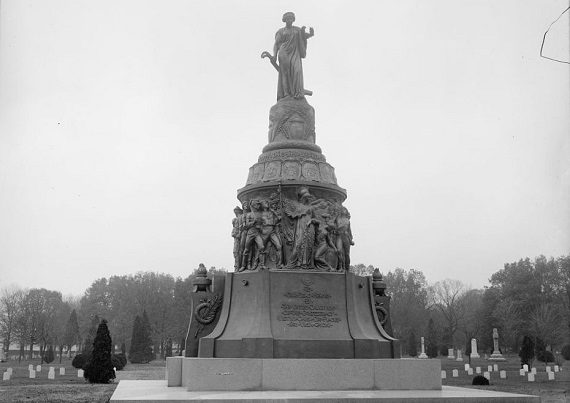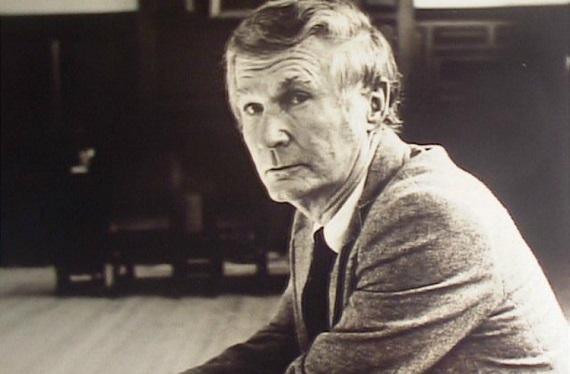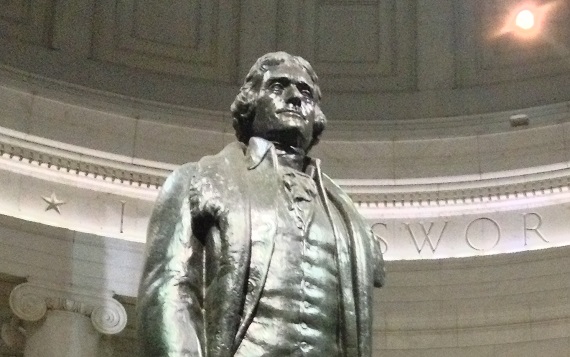This essay by Donald Davidson was originally published in The Bookman in 1932. The footnotes and links are my contributions. Such essays are maps.
In reports appearing soon after the event, the gathering of Southern writers[1] held in late October under the auspices of the University of Virginia was variously denominated “house party,” “conference,” “convocation,” or—with even greater reserve—“occasion.” Such a dubiety of terms reflects the hardship of the reporters, who must name a thing or perish beneath the editorial eye. But the meeting not only had no name.
It was further dignified by having no program that would too severely afflict the guests with a sense of duty to art or to civilization. And perhaps it had no purpose—could have none, in fact, other than to bring the writers together under just the pleasant and stately circumstances that only Mr. Jefferson’s university, possibly, could offer, and then to let happen what would. A great deal happened, both to the advantage and the pleasure of the guests. But it is no easier to interpret the gathering than to name it. I shall have to be reportorial rather than interpretative, circumstantial rather than speculative, in this account.
Some time ago, it seems, Ellen Glasgow[2] complained to James Southall Wilson[3], Poe Professor at the University of Virginia, that Southern writers saw each other too rarely, and never under ideal circumstances. She wondered whether they might not be somehow assembled for the mutual benefits that closer acquaintance would give. Professor Wilson broached the matter to the late Dr. Edwin A. Alderman, president of the university. Out of Dr. Alderman’s favourable consideration, and out of the work of Professor Wilson and an informal committee composed of Ellen Glasgow, James Branch Cabell, Archibald Henderson, DuBose Heyward, Stark Young, Thomas Wolfe, and Paul Green, the gathering was brought to pass. Some thirty-odd Southern writers were invited to come to Charlottesville for a two-days’ meeting which would be “experimental” and which would have “its main value in the opportunity for members of the group to talk with one another.”
The large number of prompt acceptances was in itself an indication of the eagerness with which the idea was received—an eagerness all the more significant, perhaps, in view of the common tendency of authors to hold aloof from meetings and organizations. A few of those invited could not come. Those who attended were: Sherwood Anderson, Katharine Anthony, John Peale Bishop, James Boyd, Herschel Brickell, Mr. and Mrs. Struthers Burt, James Branch Cabell, Maristan Chapman (that is to say, Mary and Stanton Chapman, husband and wife, co-authors), Emily Clark, Donald Davidson, William E. Dodd, William Faulkner, Ellen Glasgow, Isa Glenn, Caroline Gordon (Mrs. Allen Tate), Paul Green, Archibald Henderson, Dorothy and DuBose Heyward, Mary Johnston, Ulrich B. Phillips, Josephine Pinckney, Alice Hegan Rice and Cale Young Rice, Amelie Rives (Princess Troubetzkoy), Mrs. Laurence Stallings, Allen Tate, and Irita Van Doren. A few others were in and out at moments—Andrew Nelson Lytle, Lawrence Lee, Agnes Rothery Pratt.
It will be noted that the list is a catholic one. As Miss Glasgow remarked, it was interesting to see “how elastic the term ‘Southern writer’ may become when properly stretched.” For the list included occasional Southern residents as well as natives, émigré like Sherwood Anderson, one or two expatriates, a sprinkling of Southern writers from distances as remote as Chicago and New York, historians and critics along with novelists and poets.
There were no formal proceedings, and there was only the bare minimum of parliamentary behaviour. A large Jeffersonian freedom prevailed, and Virginia hospitality, officially represented in the able persons of Professor Wilson, Mr. Stringfellow Barr, and their colleagues, was at its most gracious in providing opportunities for agreeable fellowship and talk rather than in busily dictating a schedule of arrangements. Nobody had to attend any of the gatherings, but most of the writers in fact did attend. There were three sessions at Madison Hall that might have been named “round table” discussions in a more formal convention. The other functions were for acquaintance’ sake and not for art’s—luncheons, teas, a dinner, trips to Castle Hill and Monticello, with much lounging and strolling between times.
Perhaps these latter occasions rather than the discussion meetings received the emphasis of memory in most of the authors’ minds, as they looked back over a delightful and unusual experience. For anybody, anywhere, it is an unmatched pleasure to come to Virginia’s halls. But for Southern writers to be first-comers there to such a meeting, with Virginia as host and presiding genius—I think this was something that could be properly savoured only by Southern authors.
I do not imagine that they necessarily became any more conscious of themselves as Southerners. But, under the circumstances, even the most far-gone in “advanced” and modern views, even the most hard-boiled among them, might have been pardoned a moment’s sentimentality towards their own South. How many realistic beans may have been thus softened into an unexpected stirring of romantic loyalties, I do not pretend to know.
In a company which represented such mixed views of Southern life as might be held, say, by Mary Johnston, Emily Clark, William Faulkner, and William E. Dodd, all was serene if not harmonious. Without needing to make any overt proclamation, all behaved pretty much as if they had some natural kinship in being Southern writers—though I should be hard put to say what it was they had in common other than the old Southern faculty of being at home with one’s own place and people. At any rate, neither regionalism, nor sectionalism, nor other “isms” got much mention. Most of the sleeping dogs that have now and then growled in Southern councils dozed on unawakened.
The concerted discussions were not, however, without their animated—even their perilous—moments. A topic had been announced for general discussion: The Southern Writer and His Public[4]. But Ellen Glasgow, in opening the meeting, discarded it at once, and went on to make a brilliant and witty address which argued, in general, for standards of Southern literature that would be universal, not parochial. “Because you are not only Southern writers, but world writers,” she said (I owe the quotation to Emily Clark’s good offices), “you bring to our literature the diversity which is life, not the standardization that is death”. Her later distinction between “the truth of life, the truth of history, and the truth of fiction” was caught up and argued pro and con by historians and artists—notably U. B. Phillips, Archibald Henderson, Mary Johnston, Allen Tate, and under the considerate chairmanship of DuBose Heyward, who held a loose parliamentary rein, the talk flowed on. Cale Young Rice spoke of the alarming extent to which book pages were being dropped by newspapers everywhere, and wondered whether anything could be done to preserve the spirit of local criticism.
Next day, as the discussions proceeded, it appeared that nothing could be done, though many shared Mr. Rice’s solicitude and disliked the present channeling of literary communication through New York. At one point the writers were very nearly tempted into passing resolutions, but for one reason or another desisted. John Peale Bishop spoke wisely and temperately on the Southern tradition, which, he confessed, he had rediscovered as a stable, ordered way of life only after a considerable quest abroad. James Boyd supported Mr. Bishop’s views. But Paul Green railed tempestuously against any idea of fixity and praised the agencies in his own State—North Carolina—that had dislocated the Southern tradition and brought it into a progressive stride—such agencies as automobiles, public education, tobacco manufacturers. He fervently declared that “any little runt who is driving a high-powered car at sixty miles an hour is going toward God.”
William E. Dodd answered Mr. Green with a calm assurance that he need not worry—the machine age was dead—the depression was its dying agony—there would be machines in the future, but not a machine age. These were notable passages in the discussion meetings. But hot though they threatened to become, they were hardly passages-at-arms, they represented no more than the healthy freedom of speech which Mr. Jefferson’s ghost would have commended. Much else was said of the wise, the witty, the pleasant, by others present; and still others who might have said much, joined Mr. Cabell in a discreet silence.
To what end at last, who could tell? It would be wisest, I think, to draw no more positive conclusions than Josephine Pinckney in The Saturday Review and Emily Clark in Books[5] have already drawn. I agree with them that the best feature of the meeting was the lack of self-consciousness on the part of the guests. It was a great comfort not to see anything pretentiously “arty.” The gathering did not, it could not, in the least resemble the meetings of the editorial staffs of Broom or Secession (lately reported in The New Republic[6]), or of the average poetry society, or of any authors’ league whatsoever.
However, these are negative conclusions. I have no general and positive observations to add, except to hazard a guess that the readiness of the various writers, even though they represented discordant views of art and hostile practices, to get along together like old friends argues something for a real community of interest among Southern authors—a community which time, and maybe later meetings, will strengthen rather than diminish. Besides this, the very fact itself of the meeting, the joy which the writers took in coming together, the satisfaction which they found in such informal intercourse—all this suggests that New York, as a literary capital, is ruinously defective in not providing similar natural opportunities, and it promises, perhaps, a decentralization which, may in time work considerable changes in the literary complexion of the United States.
*****************************************************
[1] This wasn’t the first or last gathering of Southern writers; several come to mind (all worth their own post): the Poetry Society of South Carolina in Charleston, the Fugitives in Nashville, and the Fellowship of Southern Writers. Many in this gathering met again in 1932 in Charleston at an event hosted by DuBose Heyward and at Chapel Hill. Random link about the event. Atlanta Constitution article, DuBose Heyward in Chicago Daily Tribune, Scholastic article.
[2] “Glasgow and the Southern Renaissance: The Conference at Charlottesville”
[3] James Southall Wilson’s essay on the meeting in American Scholar.
[4] Faulkner’s reaction to the meeting and the topic. Thomas Wolfe tidbit.
[5] Emily Clark, “A Weekend at Mr. Jefferson’s University,” New York Herald Tribune Books (Nov. 8, 1931): 1-2.







We, here…all Southern writers.
And then, there’s Meeks…the Meeks will inherit the earth.
Thank you Chase Steely.
And speaking of Southern Writers, I recently purchased the book “Who Owns America: A New Declaration of Independence.” I will begin reading on June 19th.
You will be rewarded.
Thanks Mr. Yarbrough! I’m looking forward to it after reading “I’ll Take My Stand” early this year.